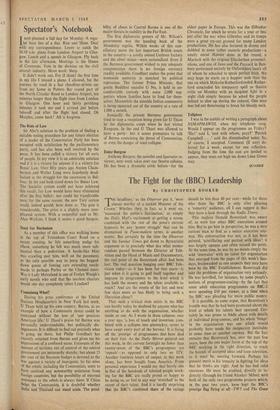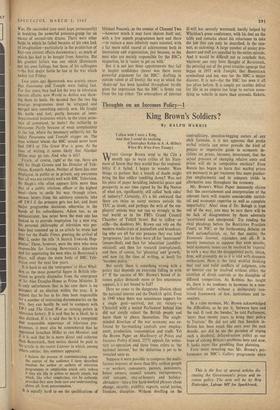The Fight for the (BBC) Leadership
By CHRISTOPHER BOOKER
a headlines,' as the Observer put it, 'were almost worthy of a sacked Minister of the Crown.' Whether they, in fact, as it went on, 'measured the public's fascination,' or simply the Daily Mail's excitement at getting a scoop, combined with the rest of the press's current hypnosis by any 'power struggle' that can be dramatised in Plane-makers terms, is another matter. But certainly by the time the Observer and the Sunday Times got down to Byzantinist argument as to precisely what day what memo- randum passed between the Director of Tele- vision and the Head of Music and Documentary, the real point of the Baverstock affair had been lost. The real question hanging over BBC Tele- vision today—as it has been for two years—is just when is it going to pull itself together and improve its programmes to the level which it has both the money and the talent available to reach? And are the events of the last and next few days more or less likely to bring such a liberation about?
That such a critical state exists in the BBC can hardly today be doubted by anyone who has anything to do with the organisation, whether inside or out. As I wrote in these columns over a year ago, 'a loss of touch and invention, com- bined with a collapse into gimmickry, seems to have swept every part of the Service.' It is living off the 'prestige' of programmes that have died on their feet. As the Daily Mirror pointed out this week, in the current fortnight no fewer than twenty-seven of the BBC's programmes are 'repeats'— as opposed to only two on ITV. Another fourteen hours of output, in this week alone, has been bought from America. From personal experience I would say that barely one in five of the hundreds of talented people work- ing for the BBC are really proud or happy to be doing so, or feel in any way 'stretched' to the extent of their talent. And it is hardly surprising that the BBC's combined share of the ratings should be less than 40 per cent—while for those who think the BBC is only after pleasing a 'minority' audience, all I can suggest is that they have a look through the Radio Times.
This malaise Donald Baverstock was aware of, as were few other BBC executives around him. But to get him in perspective, he was a very curious man to find as a senior executive any- way. His conversation was not, as it has been painted, 'scintillating and packed with ideas'; it was largely opaque and often missed the point. At the same time, he was by no means simply the wild 'innovator' with no talent for organisation- that emerged from the pages of this week's Sun- days, brainwashed as one suspects they may have been by the BBC Establishment. Baverstock did take the problems of organisation very seriously. He was horrified, for instance, by some people's notions of programme-costing--by the fact that some adult education programmes on BBC-2 were spending flO per viewer, at a time when the BBC was pleading for more public money.
It is possible, as some argue, that Baverstock's trouble was that he had been promoted above the level at which his talents best operated. Cer- tainly he was prone to fiddle about with details of individual programmes, and his whole 'image' in the organisation was one which would probably have made his resignation inevitable at some time or another anyway. But the fact remains that Baverstock has, over the past few years, been the one major force at the top of the BBC working in the right direction, to crack the bounds of accepted ideas and keep television, as it must be, moving forward. Perhaps his greatest merit is his tenacity in fighting for ideas that he thinks are right. And he has had solid successes. He must be credited, directly or in- directly (through his friend Alasdair Milne), with both of the only two programme projects which, in the past two years, have kept the BBC's prestige flag flying at all---TW3 and The Great War. He succeeded (one must hope permanently) in breaking the powerful pressure-group for an excess of second-rate drama. There were other fields in which he failed because of his own lack Of imagination—particularly in the production of first-rate current affairs documentary, so much of Which has had to be bought from America. But his greatest failure was one which illuminates not his own failings, but those of his colleagues —the first major battle he lost in the war which ended last Friday.
Two years ago Baverstock was acutely aware that Panorama and Tonight were fading fast. For five years they had led the way in television current affairs; now World in Action was show- ing them its heels. He decided that the two big prestige programmes must be scrapped and merged into something entirely new. He fought his battle and lost; partly because of inter- departmental jealousies which, in the crazy struc- ture of command, he hadn't the authority to overcome. Partly because of weak complacency at the top, where the necessary authority lay. So today Panorama and Tonight stagger on. The man without whom the BBC would never have had TW3 or The Great War is gone. At the time of writing it seems likely that Alasdair Milne may go too. And who is left?
Firstly, of course, right' at the top, there are Still Sir Hugh Greene and his Director of Tele- vision, Kenneth Adam. Neither of them has ever displayed, in public or in private, any awareness that all was not entirely well with BBC Television. Sir Hugh's role often appears little more than that of a public relations officer at the highest level—there to smile his way through crises, answer letters from the advisory councils, take off TW3 if the pressure gets too hot, and leave Major programme decisions otherwise in the hands of his subordinates. Adam too, as an administrator, has never been the man one has Looked to to provide inspiration for a new era; his personal philosophy of television was per- haps best summed up in an article he wrote last Year for the Radio Times, greeting the arrival of BBC-2, under the title 'A Stretch Towards Hap- Piness.' These, however, were the men who were responsible for forcing Baverstock's departure and for appointing the men who, in Baverstock's Place, will shape the main body of BBC Tele- vision over the next few years.
It is hard to see the 'emergence' ot How Whet- don as the most powerful figure in British tele- vision as greatly dissimilar from the emergence of Sir Alec Douglas-Home as Prime Minister. It is only unfortunate that in his case there is no Prospect of an election within the year. It is argued that he has in his time been responsible for a number of interesting documentaries on the arts; they can hardly be said to compare with 2.3V3 and The Great War as turning points in television history. It is said that he is liked; he is also disliked. If it is said that he is a competent and responsible supervisor of television pro- grammes, it must also be remembered that he aPpointed Jonathan Miller to run Monitor; and if it is said that he is more direct and coherent than Baverstock, then notice should be paid to his article in the recent Listener in which, among Others similar, this sentence appeared : 1 believe the process of communicating across the canvas of the audience I have described involves the author or authors of television Programmes in simplicities which only reduce if they are idle or artless or merely simple, but Which, like other simplicities, can be authentic Provided they stem from care and understanding, above all, from preoccupation.
It is equally hard to see the qualifications of
Michael Peacock, as the creator of Channel Two —however much it may have shaken itself out, with a few superb programmes here and there —to replace a man infinitely more talented, with a far more solid record of achievement both in innovation and organisation, just because, to the men who are mainly responsible for the BBC's stagnation, he is 'easier to get on with.'
But it is not just these appointments that fail to inspire confidence (never was there more powerful argument for the BBC'.: drafting in outside talent at all levels); the way in which the 'shake-up' has been handled throughout hardly gives the impression that the BBC is firmly run from the top either. The atmosphere of internal
has severely worsened; hardly helped by Wheldon's press conference, with his feet on the table and remarks about his reluctance to take the job that can only be described, in the con- text, as sickening. A large number of senior pro- ducers and staff are appalled by the entire episode. And it would be difficult not to conclude that, whatever one may have thought of Baverstock, the petering out of the great creative upsurge that began in 1957 with Tonight, that Baverstock symbolised and led, was for the BBC a major disaster. It is not—for the BBC has seen it all too often before. It is simply yet another defeat for life in an empire too large to sustain some- thing so volatile in more than sporadic flickers.



































 Previous page
Previous page